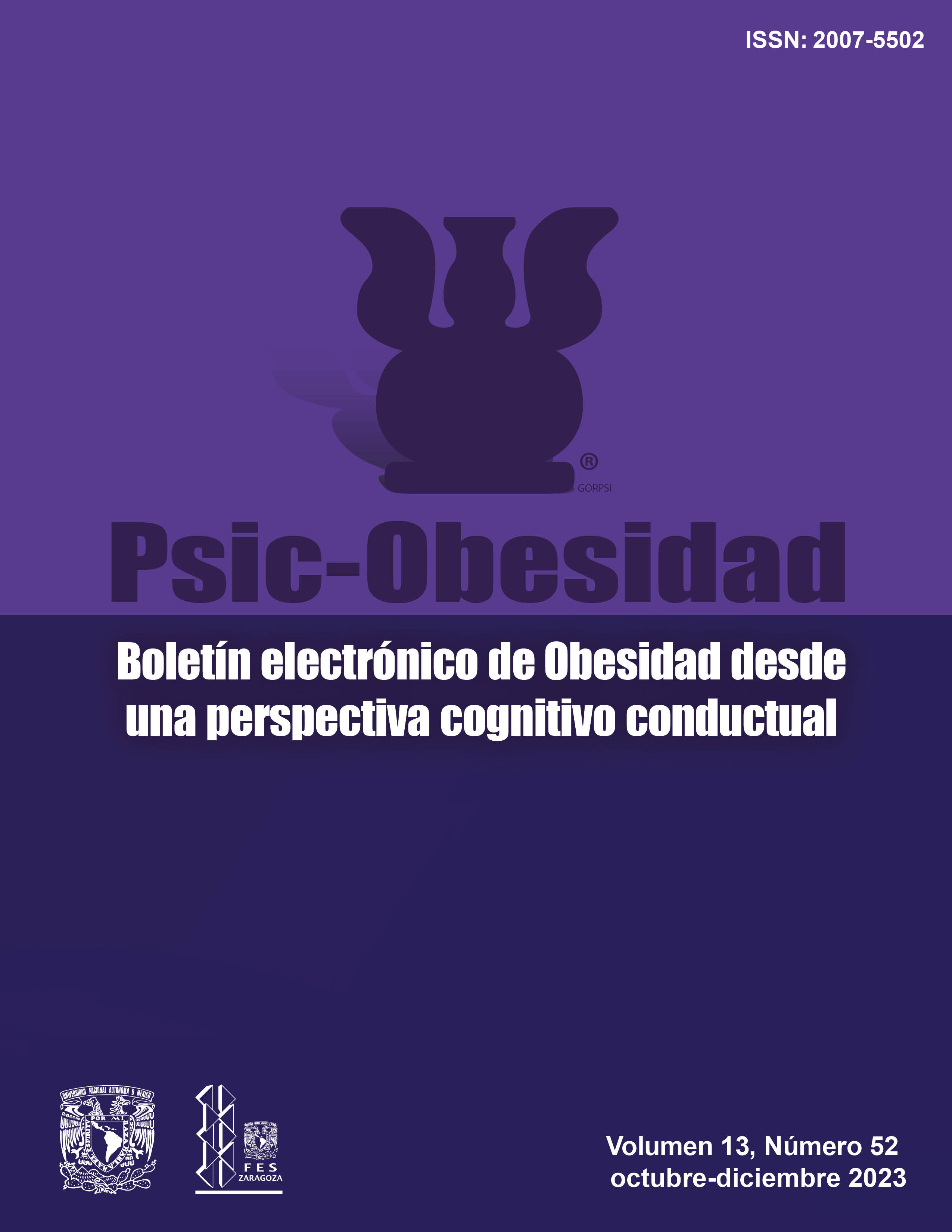Body weight during COVID-19 confinement
Main Article Content
Abstract
Situations such as poor diet, physical inactivity and sedentary behaviors have caused Mexico to develop a 72.5% prevalence of overweight and obesity, which places it among the five countries with the highest incidence worldwide, being one of the countries that has gained the most weight during the COVID-19 pandemic. Approximately 1 in 3 adults are overweight or obese, having the highest rate of overweight and obesity among its population, thus triggering other ailments. However, due to the pandemic, the numbers have been increasing. The report “Actions & interventions for weight loss” revealed the average weight that people have gained per country during the pandemic placing Mexico in first place with an average of 8.5kg per inhabitant (Santos, Rico, Carballo and Abelairas, 2022). This is a cross-sectional study of literature review from indexed journals, as well as a search in the PubMed database. As inclusion criteria, scientific articles in English and Spanish were taken into account, as well as those published during the COVID-19 pandemic period in a period of no more than a few years of publication.
Downloads
Article Details
Citas en Dimensions Service
References
Ateş-Özcan, B. & Yeşİlkaya, B. (2021). Adverse Effect of Emotional Eating Developed During the COVID-19 Pandemic on Healthy Nutrition, a Vicious Circle: A cross-sectional descriptive study. Rev Esp Nutr Hum Diet., 25(Supl. 2), e1144. doi: 10.14306/renhyd.25.S2.1144
Azrak, M. Á., Fasano, M. V., Avico, A. J., Sala, M., Casado, C., Padula, M., Kruger, A. L., Malpeli, A., & Andreoli, M. F. (2023). Prolonged body weight gain, lifestyle changes and health-related quality of life in children during the COVID-19 pandemic lockdown: A follow-up study. European journal of clinical nutrition, 77(4), 460-467. https://doi.org/10.1038/s41430-022-01252-w
Bruno-Gutiérrez, S. & Orihuela-Quispe, K. (2021). Weight gain and physical inactivity during the COVID-19 pandemic. Rev Panam. Salud Publica, 45, e136. https://doi.org/10.26633/RPSP.2021.136
Etchegaray-Armijo, K., Fuentealba-Urra, S. & Bustos-Arriagada, E. (2023). Factores de riesgo asociados al sobrepeso y obesidad en niños y adolescentes durante la pandemia por COVID-19 en Chile. Rev. chil. nutr., 50(1), 56-65. http://dx.doi.org/10.4067/S0717-75182023000100056
Flores-Olivares, L. A., Cervantes-Hernández, N., Quintana-Mendias, E., Enríquez Del Castillo, L. A. (2021). Actividad física y estilo de vida sedentario en adultos, cambios durante el confinamiento por la pandemia de Covid-19. Salud Publica Mex., 9(63), 825-826. doi: 10.21149/13199.
Huang, J., Chan, S. C., Ko, S., Wang, H.H.X., Yuan, J., Xu, W., et al. (2023). Factors associated with weight gain during COVID-19 pandemic: A global study. PLoS ONE, 18(4), e0284283. https://doi.org/10.1371/journal.pone.0284283
Kaggwa, M. M., Favina, A., Najjuka, S. M., Zeba, Z., Mamun, M. A., & Bongomin, F. (2021). Excessive eating and weight gain: A rare post-acute COVID-19 syndrome. Diabetes & metabolic syndrome, 15(5), 102252. https://doi.org/10.1016/j.dsx.2021.102252
Kinoshita, K., Ozato, N., Yamaguchi, T., Bushita, H., Sudo, M., Yamashiro, Y., Mori, K., Katsuragi, Y., Sasai, H., Murashita, K., Takahashi, Y. & Ihara, K. (2023). Association of the COVID-19 pandemic with changes in objectively measured sedentary behaviour and adiposity. International journal of obesity, 47(5), 375–381. https://doi.org/10.1038/s41366-023-01274-9
Li, L., Taeihagh, A., & Tan, S. Y. (2023). A scoping review of the impacts of COVID-19 physical distancing measures on vulnerable population groups. Nature communications, 14(1), 599. https://doi.org/10.1038/s41467-023-36267-9
Muñoz-Salvador, L., Briones-Urbano, M. y Pérez, Y. (2022). Cambios en el comportamiento alimentario de personas adultas con elevado nivel académico durante las diferentes etapas del confinamiento domiciliario por COVID-19 en Iberoamérica. Nutr Hosp, 39(5), 1068-1075. https://dx.doi.org/10.20960/nh.04018
Pamplona, F. (2020). La pandemia de COVID-19 en México y la otra epidemia. Espiral, 27(78-79), 265-302. https://doi.org/10.32870/eees.v28i78-79.7208
Pearl, R. L., & Schulte, E. M. (2021). Weight Bias During the COVID-19 Pandemic. Current obesity reports, 10(2), 181-190. https://doi.org/10.1007/s13679-021-00432-2
Rubio-Herrera, M. A. y Bretón-Lesmes, I. (2021). Obesidad en tiempos de COVID-19. Un desafío de salud global. Endocrinología, Diabetes Y Nutrición, 68(2), 123-129. https://doi.org/10.1016/j.endinu.2020.10.001
Sandoval-Bosh, E. (2021). Influencia de la pandemia por COVID-19 en la alimentación. Boletín sobre COVID-19, 2(14), 3-6. https://dsp.facmed.unam.mx/wp-content/uploads/2022/03/COVID-19-No.14-03-Influencia-de-la-pandemia-por-COVID-19-en-la-alimentacion.pdf
Santos-Miranda, E., Rico-Díaz, J., Carballo-Fazanes, A. y Abelairas-Gómez, C. (2022). Cambios en hábitos saludables relacionados con actividad física y sedentarismo durante un confinamiento nacional por covid-19. Retos, 43, 415-21. https://recyt.fecyt.es/index.php/retos/article/view/89425
Secretaría de Salud. (2021). Encuesta Nacional de Salud y Nutrición 2021. Instituto Nacional de Salud Pública. https://ensanut.insp.mx/encuestas/ensanutcontinua2021/
